This week, Australia’s business lobby pushed back hard against Liberal leader Peter Dutton’s plan to moderately lower the country’s migrant intake.
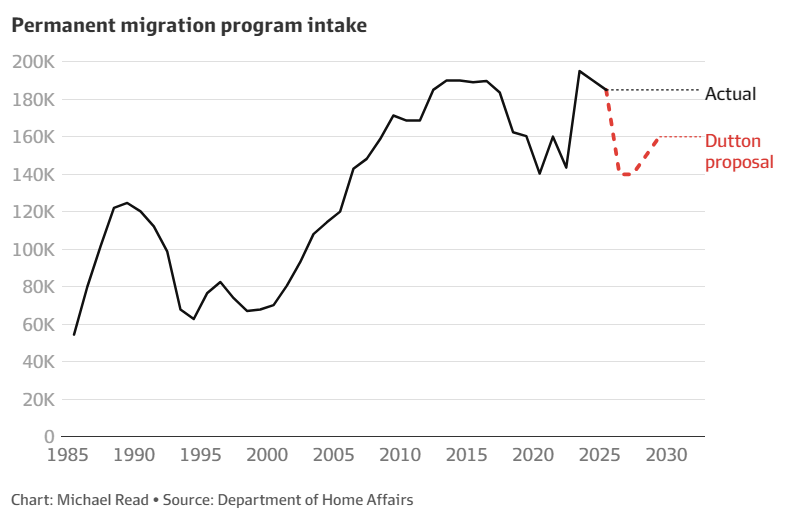
Australian Chamber of Commerce & Industry (ACCI) CEO Andrew McKellar said that the Coalition’s migration target would be hard to achieve without having a severe impact on the economy, particularly in sectors that still have significant skills shortages.
“It’s ringing alarm bells for business because we think it would be mathematically very difficult to achieve the sorts of numbers that they’ve set out”, McKellar said.
“It would have to have a very material impact across a range of areas where we have still very severe skill shortages”.
“So that means areas like engineering and nursing, teaching, hospitality professions. All of these areas would have to be facing, I think, further challenges in terms of securing the skill requirements that we need”, he said.
Business Council of Australia chief executive Bran Black made similar arguments.
“I’m concerned about any proposal to further reduce temporary skilled migration, through a cut in net overseas migration, due to the negative impact it may have on the economy”, Black said.
“It may also compound our existing skill shortages and make it harder to do business”.
Australian Industry Group CEO Innes Willox in turn argued that cutting the skilled component of the migration program would be a “momentous act of economic self-harm”.
“To cut the skilled component of the migration program would be a momentous act of economic self-harm. If governments want to cut the migration program for whatever reason, they should look elsewhere beyond the skilled pathway”.
The business lobby’s claims were expertly ridiculed by The Glass Pyramid on Twitter (X):
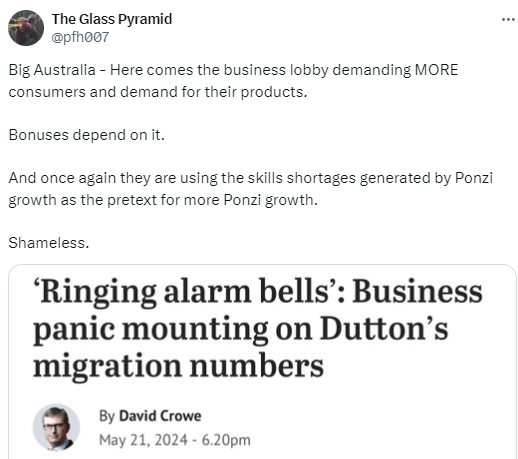
Independent economist Tarric Brooker also questioned why shortages among highly skilled worked are no better today than when the international border was reopened, despite record net overseas migration:
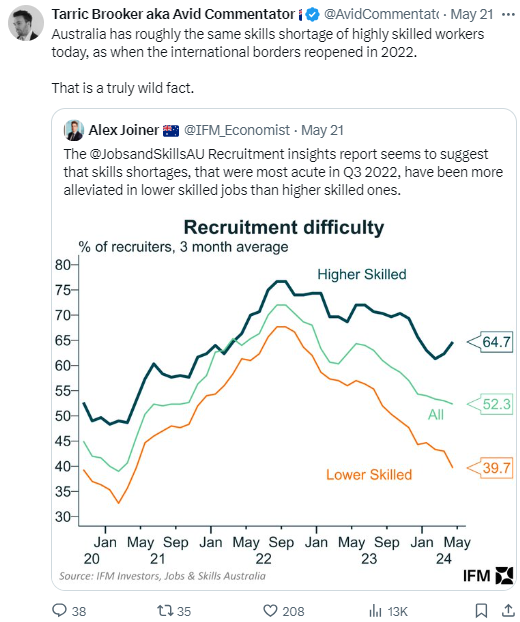
The reality is that most of Australia’s immigration is low-skilled.
Not only has Australia received record volumes of temporary foreign students and working holiday makers, who work in low-skilled jobs, but most ‘skilled’ migrants also work in lower-skilled jobs.
For example, the Migration Review showed that 51% of international university graduates with bachelor’s degrees were working in unskilled jobs three years after graduation:
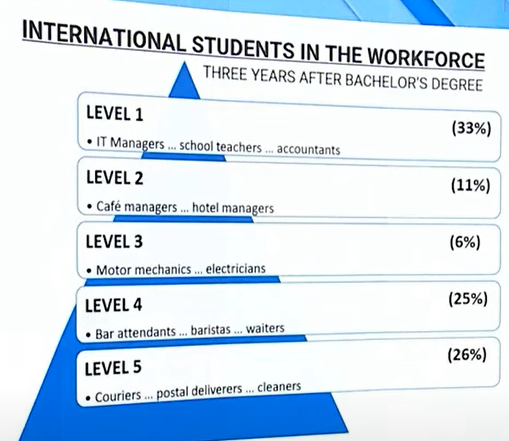
Source: Migration Review (2023)
International student graduates earn significantly less than local born graduates and have worse labour market outcomes:
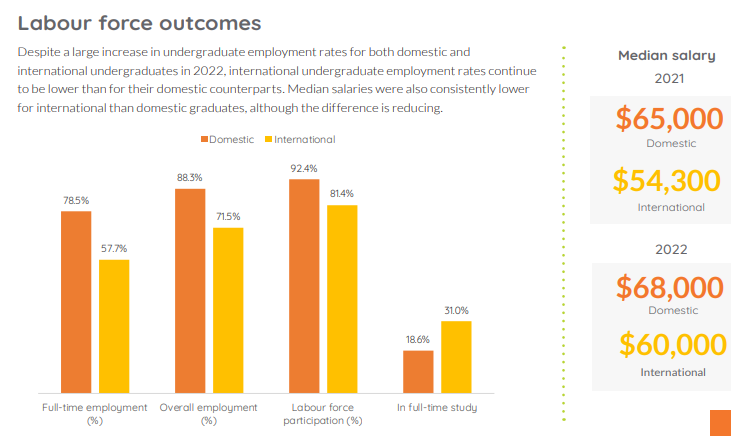
Source: Graduate Outcomes Survey
‘Skilled’ migrants get paid over 10% less than local workers:
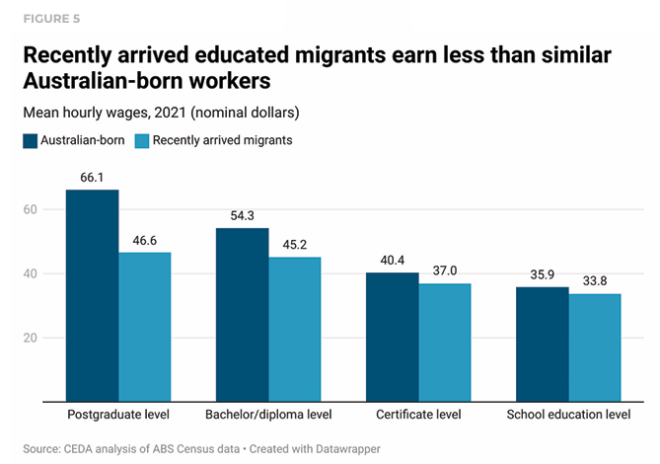
Hilariously, Andrew McKellar mentioned engineering as an area of shortage that would be negatively impacted by Dutton’s migration reforms.
Yet, 60% of Australian engineers are foreign born and nearly half of them work in low-skilled jobs unrelated to engineering, such as driving Uber.

Cover of Engineering Magazine, “Create” in November 2021.
If this is what the business lobby means by “skilled migration”, then the nation is in deep trouble.
ACCI CEO Andrew McKellar also repeated the lie that international education is an enormous export industry.
“We shouldn’t be capping an export industry like that – we’re not talking about capping iron ore exports, or LNG exports, or something like that”, he said.
“And I think in terms of the impact on housing affordability issues, the international students would be having a relatively muted impact in that space”.
The notion that international education is one of Australia’s great export industries has been debunked already.
Most foreign students come to Australia with little savings from their own countries. They then work in Australia to pay their living costs and tuition. Many also send funds back home to their families.
Money earned and paid in Australia by foreign students is not an export, although the ABS incorrectly classifies it as such.
Moreover, the comparison with other genuine export industries is asinine. Those industries don’t bring hundreds of thousands of people into Australia each year to compete for local homes, infrastructure, and jobs.
International education is really a people-importing immigration industry, not a genuine export industry.
Moreover, McKellar’s claim that “international students would be having a relatively muted impact” on housing is absurd given the explosion in rents:
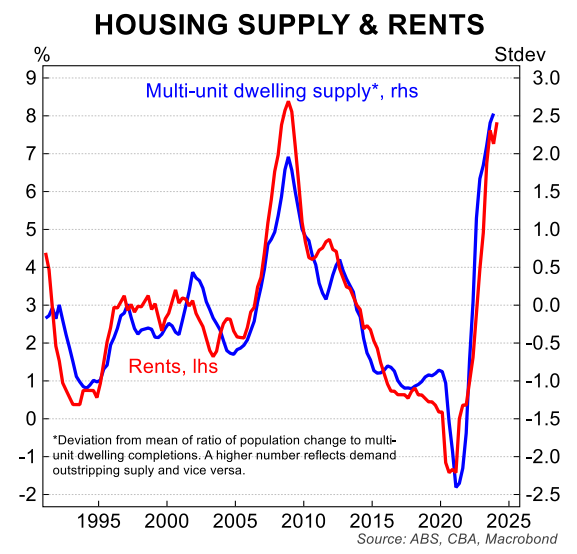
As reported in The Australian last month, more than 80% of international students rent in the private market.
“At least 400,000 international students have been forced into a private rental market with the tightest vacancy rates on record”, The Australian reported.
Australia needs a much smaller, highly skilled, and highly paid migration system. This would maximise economic benefits for Australians while minimising costs.
Sadly, the business lobby has no interest in maximising the welfare of Australians. All it cares about is maximising its own profits.

